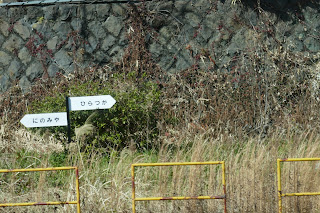 |
| Trying very hard to be culturally appropriate! |
 |
| Classic example of 1/3 hiragana, 1/3 katagana, 1/3 kanji at the Sake Tasting. |
Oh, well. I started studying for real when we boarded the first plane (of 3) for Japan.
Hiragana is the curlier/rounder phonetic system they teach schoolchildren first. Japanese words are written in Hiragana when they are intended to be easy to understand. If you know your Sushi fish orders in Japanese, for example, you can easily read or recognize Maguro, Sake, Ika, Hirame, Saba, Uni, etc. which are written in Hiragana on a sushi menu (or traveling sign on conveyer-belt sushi).
 |
| Example of hiragana train help. |
 |
| Nighttime view of Kakegawa Castle. |
What I'd learned last time was that the average thing I'm trying to read in Japan (menu, sign with directions or warnings, etc.) is likely 1/3 Hiragana, 1/3 Katakana, and 1/3 Kanji. I know about 50 Kanji from my Mandarin studies and even though they pay dividends in both Japanese and Chinese, I didn't intend to do any more work on them this trip (because they are hard!).
 |
| Katakana |
 |
| Hiragana "Gi" flashcard -- typical Japanese vocabulary with explanations. |
 |
| Katakana "Gi" flashcard -- note the English cognates. |
All of a sudden, just by learning 48 phonetic symbols, I could read things and sound them out and understand a *ton* more of what was going on.
 |
| Wa-shi-n-to-n-ho-te-ru-pu-ra-za Washington Hotel Plaza The only visible sign for our hotel from the street Katakana for the win! |
 |
| I basically walked around sounding out signs all day and night. |
Bi-ru (long i, like ee in English) -- Beer
U-wi-su-ki (long U, like ewe) -- Whisky
Wa-i-n -- Wine
So-fu-to-du-ri-n-ku (long O, like sew) -- Soft Drink
A-i-su-ku-rii-mu -- Ice Cream
And so on...And then, his mind was blown too! He's watched me try to remember the vocabulary necessary to translate a menu too many times to count. This was not that! He could listen to me sound things out, and, often, because he was only listening to the noises, he could understand what it was supposed to be in English while I was still focused on the Katakana and how to pronounce each one correctly.
French Fries? フライドポテト (Fu-ra-i-do-po-te-to) (e like Spanish, "ay")
Katakana is like a secret Japanese decoder ring for English speakers! There are even multiple words that have a traditional Japanese pronunciation as well as a Katakana imported foreign pronunciation and you can just totally cheat and use the foreign pronunciation. I've *never* leveled up in my comprehension of a language as fast I did learning Katakana.
 |
| Typical hand-written menu |
We had fun deploying this power for the rest of the trip. We could now go into small local restaurants with no English or pictures and handwritten menus (where we couldn't cheat with Google translate) and bumble our way to get seated, and then sound out the portion of the menu in hiragana and katakana and order. It was great -- typically 50% of the time we knew what we were getting, 25% we knew some of what the ingredients were but not all or the preparation so we were usually pleasantly surprised, and 25% of the time, the server either refused to serve us what we requested, or explained in more detail because we clearly didn't fully understand.
Final Thought: Of course the best example of leveling up and superpowers I've ever experienced in real life come from an experience in Japan. Of course.

4 comments:
Does your huge smile in photo #1 give you away as 'Merican? :)
@Arvay - probably.
I discovered the same thing when I was in Japan. On my first day, searching for my capsule hotel in Osaka, there was only one sign in katakana that indicated where the hotel was (in an alley, with no addresses). Of course, knowing Kanji helped enormously as well, but I could only read and not pronounce the characters.
@Jen -- the Kanji/Hanzi symbolic writing system is so fascinating. In many ways it is obviously *so* much more useful than a pronunciation-based system (for comprehension of the reader). But, then, when you are in the moment, understanding the Kanji and not knowing how to say them at all and trying to get anything done is super frustrating... so different than all the other languages I've studied.
Post a Comment